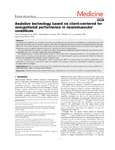Assistive technology based on client-centered for occupational performance in neuromuscular conditions

Use this link to cite
http://hdl.handle.net/2183/24111
Except where otherwise noted, this item's license is described as Creative Commons Attribution 4.0 International License (CC-BY 4.0)
Collections
- Investigación (FCS) [1293]
Metadata
Show full item recordTitle
Assistive technology based on client-centered for occupational performance in neuromuscular conditionsDate
2019Citation
Pousada García T, Loureiro JP, González BG, Nieto-Rivero L. Assistive technology based on client-centered for occupational performance in neuromuscular conditions. Medicine (Baltimore). 2019 Jun;98(25):e15983.
Abstract
[Abstract] Knowledge of the patient’s own perception of functioning and dependence, and of environmental factors, is of significant value. The
main goals of this study are (1) to obtain a general profile of the occupational performance of persons with neuromuscular disorders
(NMD) and their needs related to that performance and (2) to determine the support resources (assistive technologies [AT],
adjustment, and/or caregiver) required to improve or maintain their level of independence.
This cross-sectional study involved 24 persons with NMD. The functional independence measure (FIM), the checklist of a home’s
accessibility level, and a specific questionnaire were administered.
The sample included 14 women (58.3%) and 10 men (41.7%). A mean of 61.7 (standard deviation=17.2) was obtained for FIM
motor, over 91, indicating a moderate level of dependence. The AT most frequently used was a wheelchair (70.8%). Architectural
barriers were detected in the majority of users’ homes (87.5%).
Concise assessment of the independence needs of people with NMD, according to their occupational performance, and
prescription of resources to meet those needs are required. This procedure should be implemented in healthcare programs,
including care to a caregiver.
Keywords
Activities of daily living
Assistive technology
Independence
Neuromuscular disorders
Occupational performance
Assistive technology
Independence
Neuromuscular disorders
Occupational performance
Editor version
Rights
Creative Commons Attribution 4.0 International License (CC-BY 4.0)
ISSN
0025-7974
1536-5964
1536-5964






